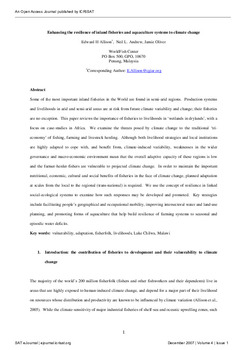Enhancing the resilience of inland fisheries and aquaculture systems to climate change

Citation
Allison, E.H.; Andrew, N.L.; Oliver, J. (2007). Enhancing the resilience of inland fisheries and aquaculture systems to climate change. Journal of SAT Agricultural Research 4(1)
Some of the most important inland fisheries in the World are found in semi-arid regions. Production systems and livelihoods in arid and semi-arid areas are at risk from future climate variability and change; their fisheries are no exception. This paper reviews the importance of fisheries to livelihoods in ‘wetlands in drylands’, with a focus on case-studies in Africa. We examine the threats posed by climate change to the traditional ‘tri-economy’ of fishing, farming and livestock herding. Although both livelihood strategies and local institutions are highly adapted to cope with, and benefit from, climate-induced variability, weaknesses in the wider governance and macro-economic environment mean that the overall adaptive capacity of these regions is low and the farmer-herder-fishers are vulnerable to projected climate change. In order to maintain the important nutritional, economic, cultural and social benefits of fisheries in the face of climate change, planned adaptation at scales from the local to the regional (trans-national) is required. We use the concept of resilience in linked social-ecological systems to examine how such responses may be developed and promoted. Key strategies include facilitating people’s geographical and occupational mobility, improving intersectoral water and land-use planning, and promoting forms of aquaculture that help build resilience of farming systems to seasonal and episodic water deficits.
Permalink
Date Available
Type
ISSN
0973-3094
Research Themes
Language